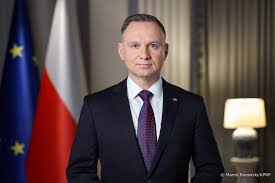
Relations between Duda — who is close to the nationalist Law and Justice (PiS) opposition party — and the government have been difficult since Prime Minister Donald Tusk’s coalition swept to power in 2023.
Duda has since vetoed most of the government’s legislative initiatives and helped prolong the judicial chaos introduced under the previous PiS administration.
“The ballot to select the next president of Poland will take place on May 18 of this year,” parliamentary speaker Szymon Holownia told reporters, adding that if necessary, a run-off would be held on June 1.
A second round will take place if no candidate wins more than 50 percent of votes in the first round.
“Needless to say, it is an important moment. We are choosing the commander of the armed forces, we are choosing someone who will lead the state in these very difficult times over the next five years,” Holownia added.
The PiS led the government from 2015 until 2023 when it lost power to Tusk’s coalition, which includes his Civic Coalition as well as the smaller Third Way and Left parties.
But the PiS remains the largest party in parliament.
Duda will leave office in August after the maximum two presidential terms allowed.
The current election frontrunner is Warsaw mayor and Civic Coalition candidate Rafal Trzaskowski, who would receive around 36 percent of votes according to opinion polls.
The PiS has backed historian Karol Nawrocki, head of the Institute of National Remembrance (IPN), which is charged with investigating Nazi and communist-era crimes.
With Nawrocki polling at 29 percent, he and Trzaskowski would likely find themselves in a run-off.
Other candidates include parliamentary speaker Holownia, who is standing for his centre-right Poland 2050 party — part of the governing coalition — and far-right Confederation party choice Slawomir Mentzen. Both are polling at around 10 percent.
The election will come near the end of Poland’s six month turn as European Union president that ends in June.











